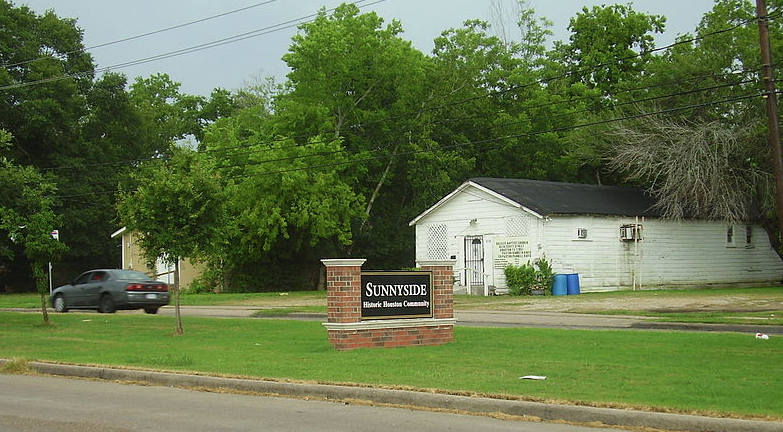When people discuss privacy today, it's usually in reference to online security, data sharing and hacking concerns.
A recent Pew Research Center survey, for example, asked respondents about their comfort level with things like smart thermostats, social media and digital medical records, among other new, potentially invasive technologies. But that's only one part of the conversation.
"Privacy is a topic we hear about all the time now," said Cayce Hughes, a Kinder Institute Scholar and doctoral candidate with the University of Chicago's sociology department. "But those conversations typically have to do with digital privacy, online confidentiality -- things that may be of more concern for affluent people who have the resources to be spending (time) online or even have access to the Internet," he said. "It always struck me that the experiences of the poor are left out of that conversation."
In dozens of interviews with mothers living in Houston's Sunnyside neighborhood, Hughes tried to understand how they navigated privacy concerns while applying for a variety of social assistance programs. And what he found was an invasive process fraught with problematic enforcement and punitive measures.
Hughes asked respondents to describe their general experiences when seeking government assistance, including the kinds of questions they were asked and how they felt about them. Hughes said he didn't introduce privacy as the focal point of the conversations -- but the topic came up again and again. "For most people, it was right away," he said. "Usually one of the first comments was, 'They ask you for so much.'"
Just outside the 610 loop on Houston's southeast side, Sunnyside is one of Houston's historically black communities. Incorporated into the city in 1956, the neighborhood maintains a rural feel with horses scattered among the backyards and shaggy lots. Its fortunes have ebbed and flowed, and it's struggled in recent years with school closures, illegal dumping and high poverty and crime rates.
Through churches, community organizations and mothers, Hughes interviewed 67 women about their experiences applying for social services. Whether they were applying for temporary assistance for needy families (TANF), childcare assistance, the supplemental nutrition assistance program (SNAP) or Medicaid, the mothers shared common experiences, starting with threats -- from fines to jail time -- if the applicants provide any inaccurate information. "There's a full page that lists all the different punishments you face if you don't tell the truth," said Hughes.
The questions themselves also presented a compromise to privacy. "A lot of the questions are asked around eligibility but mothers read it as: 'you want all this information in a way to punish me,'" he said. In particular, questions about a child's father were sometimes perceived as questions about an applicant's sexual history. "There's some fear of stigma if they were a victim of rape," he said, "or have children from multiple fathers."
But perhaps the most significant compromise of privacy came not from the application itself but from what the state does with the information in it. In Texas, when a mother applies for TANF, Medicaid or subsidized childcare in Harris County -- and she provides information about her child's father -- the state automatically opens a child support case against him, whether the mother wants one opened or not.
The state sees this as a way to make sure that both parents are contributing to their child's upbringing. From each child support check, the state collects a flat $75 to help offset its costs providing social services to families, according to Hughes.
But for some mothers, he said, the father or his family was already providing some level of informal support, when possible, whether it was buying diapers or helping with groceries. Though it may not have be sufficient, mothers didn't want risk alienating and jeopardizing that support with a court order.
In some cases, if a child's father found it difficult to find work after being incarcerated, the mother would be sympathetic to his struggle and be hesitant to draw them into a system with strict punishments. Though many states have harsh penalties for people who fail to pay child support, Texas is among the strictest, said Hughes. "You are charged interest at a rate of 6 percent, you face jail time and you can lose your drivers license," he said. "All of these things kind of create a revolving door to prison."
Law enforcement agencies can also have access to information provided in a social assistance application, said Hughes, which means mothers could be unintentionally exposing a father who, for example, may be in violation of his probation.
Some of the mothers' privacy concerns could be addressed simply with additional training. Hughes said mothers indicated it might simply be helpful if caseworkers filling out forms with the mothers simplfy prefaced their questions with the statement, "I know this is personal, but."
Still, some concerns could only be addressed through policy reforms. Harris County, for example, does not have to require that mothers have a formal child support order in order for a mother to qualify for subsidized childcare. And the state could reevaluate its punitive measures for failing to pay child support. "If the real goal is to help poor families and mothers make ends meet and move out of poverty," Hughes said, "I don’t think that’s what's happening with these policies. They're putting a lot of pressure on poor families and particularly mothers."

